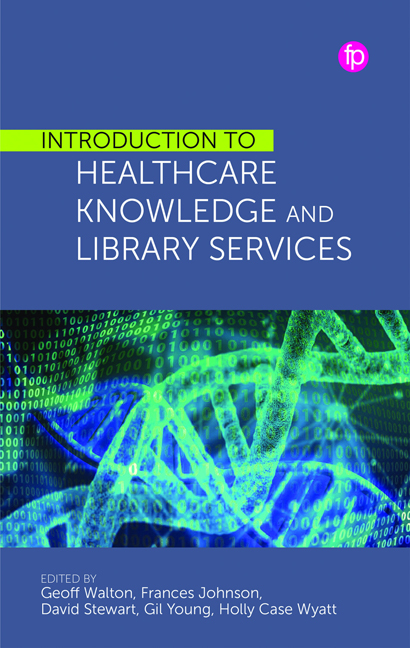Book contents
- Frontmatter
- Contents
- Figures, Tables and Case Studies
- Notes on Contributors
- Foreword
- How to Use this Book
- 1 An Introduction to Healthcare Knowledge and Library Services
- 2 Strategic Development for Healthcare Knowledge and Library Services
- 3 Exploring the Training and Development Needs of the Healthcare Knowledge and Library Services Workforce: A Case Study
- 4 Advocacy and How Knowledge and Library Specialists Tailor Services to Meet the Needs of Their Stakeholders
- 5 Mobilising Evidence and Knowledge
- 6 Internal and External Partnerships
- 7 Health Literacy, Patient Information and Combating Misinformation
- 8 Resource Discovery and Open Access
- 9 Growing the Evidence Base in Healthcare Knowledge and Library Services
- 10 Measuring Progress, Value and Impact in NHS Knowledge and Library Services
- 11 Reflective Practice in Healthcare Settings
- 12 Looking to the Future of Healthcare Knowledge Services
- Index
9 - Growing the Evidence Base in Healthcare Knowledge and Library Services
Published online by Cambridge University Press: 22 February 2024
- Frontmatter
- Contents
- Figures, Tables and Case Studies
- Notes on Contributors
- Foreword
- How to Use this Book
- 1 An Introduction to Healthcare Knowledge and Library Services
- 2 Strategic Development for Healthcare Knowledge and Library Services
- 3 Exploring the Training and Development Needs of the Healthcare Knowledge and Library Services Workforce: A Case Study
- 4 Advocacy and How Knowledge and Library Specialists Tailor Services to Meet the Needs of Their Stakeholders
- 5 Mobilising Evidence and Knowledge
- 6 Internal and External Partnerships
- 7 Health Literacy, Patient Information and Combating Misinformation
- 8 Resource Discovery and Open Access
- 9 Growing the Evidence Base in Healthcare Knowledge and Library Services
- 10 Measuring Progress, Value and Impact in NHS Knowledge and Library Services
- 11 Reflective Practice in Healthcare Settings
- 12 Looking to the Future of Healthcare Knowledge Services
- Index
Summary
Introduction
This chapter introduces evidence-based library and information practice, focusing on the importance of developing the evidence base for healthcare knowledge and library services. It highlights the importance of librarians conducting research to develop the evidence base for the profession. If the research is to grow the evidence base, the authors argue that part of the research process is the sharing of findings. The chapter covers skills both for conducting research and for librarians supporting research teams.
Introducing evidence-based library and information practice
Healthcare librarianship is central to enabling health and care professionals to provide and demonstrate evidence-based practice. Evidence-based practice, which grew out of evidence-based medicine, depends upon access to and application of evidence that is based on research, alongside clinical judgement based on experience (Greenhalgh, 1999). Building on their role in providing evidence to NHS colleagues, healthcare librarians have worked with librarians across other sectors on the development of evidence-based practice for librarianship itself.
Evidence-based library and information practice (EBLIP) is an approach to professional decision-making that grew out of the initial evidence-based medicine movement, when health librarians realised the importance of practising what they were preaching to clinicians (Koufogiannakis and Brettle, 2016a). The most recent model of EBLIP (Koufogiannakis and Brettle, 2016a) promotes an overall approach to practice that is about ‘being evidence-based’ (see Figure 9.1 on the next page) rather than simply using evidence in decision-making. The model acknowledges the use of research evidence, local evidence and professional knowledge (Koufogiannakis, 2011, 53) and a cyclical process involving: articulating problems or questions; assembling the evidence; assessing the evidence; agreeing a way forward; and adapting by revisiting goals and reflecting in order to evaluate what is working and what needs to change (Koufogiannakis and Brettle, 2016b).
The literature on the use of evidence by healthcare librarians and knowledge specialists for their own profession suggests that there is a greater emphasis on supporting evidence-based medicine rather than developing EBLIP (Spring et al., 2014). Murphy uses the analogy of a midwife, enabling others to give birth to research rather than conducting research and publishing to contribute to the evidence base for library and information practice (Murphy, 2015).
In line with the approach to being evidence-based noted in Figure 9.1 above, this chapter considers the importance of developing the evidence base for healthcare knowledge and library services.
- Type
- Chapter
- Information
- Introduction to Healthcare Knowledge and Library Services , pp. 143 - 162Publisher: FacetPrint publication year: 2024

